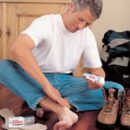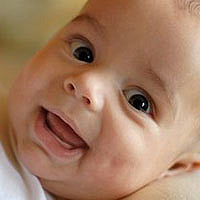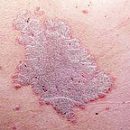Many parents are familiar to such a situation when almost six months they do not see their child healthy, because one «cold» replaces another. And if the doctor asks them: «What complain?», They answer: «The child often ill».
Content
Patriotic medicine often with illness are considered: children under 1, if cases of sharp respiratory diseases (ORZ) - 4 or more per year; Children from 1 to 3 years old - 6 or more orzh per year; Children from 3 to 5 years old - 5 or more orzh per year; Children over 5 years old - 4 or more orzh per year.
Often the child is ill not only often, but also for a long time (more than 10 - 14 days one ORZ). Long-friendly children can also be attributed to the category of often sick.
Externally, OSR can manifest themselves with a runny nose, coughing, redness of the throat, total weakness, temperature rise. Often-sick children may be some one, but a long-term symptom, for example, a permanent cough or swinging, constant discharge from the nose, while the temperature may be normal. If the child has constantly increased the temperature, but there are no symptoms of ARZ, this is often a sign of chronic infections, and requires a detailed medical examination.
Why a child often sick
If the child often sicks, it means that his immunity is weakened. Consider the main factors leading to the weakening of immunity.
The functions of the immune system begin to form intrauterine, therefore intrauterine infection, presence or morpho-functional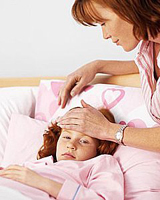 B. The baby's immaturity can lead to the fact that the child will later become often sick. The following important factor for the formation of immunity is maternal milk, therefore children on breastfeeding rarely sick ORZ, and on the contrary, the early transition to artificial mixtures can lead to the fact that in the first year of life the child will begin to hurt with colds.
B. The baby's immaturity can lead to the fact that the child will later become often sick. The following important factor for the formation of immunity is maternal milk, therefore children on breastfeeding rarely sick ORZ, and on the contrary, the early transition to artificial mixtures can lead to the fact that in the first year of life the child will begin to hurt with colds.
In the first year of life or at an older age, the baby as a result of various adverse factors may develop background states, weakening immunity. These are intestinal dysbiosis, hypovitaminosis, Rahit.
The pronounced weakening of immunity often occurs after severe diseases or operational interventions. If the child has sled dysentery, salmonellosis, pneumonia, angina, his immunity is weakened. Very strongly weaken the function of the immune system viruses. After the transferred influenza, measles, other viral diseases, the child has increased sensitivity to infections and can become often ill.
Weakens immunity long acceptance of some drugs. Such drugs are immunosuppressants used in autoimmune diseases (system red lupus, rheumatoid arthritis, etc.), some antitumor drugs, steroid hormonal preparations for intake, most antibiotics. In the event that the use of these drugs is necessary, it is desirable to take preventive measures to maintain the normal functioning of immunity.
The presence of a child of chronic diseases also contributes to the weakening of the protective mechanisms and may cause the child often sick. Such diseases may be chronic hymorite, tonsillitis, adenoids, sluggish and atypical infections caused by such pathogens as a mycoplasma, pneumaticist, chlamydia, jersinia. Often, the causes of imminent immunity are worms, which are quite difficult to diagnose on Calla.
There are congenital immunodeficiency states, including insulated immunodeficiency when a child has some kind of immune system united. Children with such immunodeficiencies can often hurt any recurrent, t.E. Repeating diseases. If the child is constantly sick of the same type of disease, for example, a recurrent thrush, chronic ENT-organ infection, it needs to be examined in terms of the existence of congenital immune.
Finally, the proper balanced nutrition and mode have great importance for the normal functioning of immunity. The child can often be cheating for a long time if there is not enough vitamins or food in its diet - unbalanced, for example, there are no animal products or food products containing a large amount of carbohydrates, but small proteins and fats. If the child is rarely in the fresh air, leads a sedentary lifestyle, inhales tobacco smoke from smoking adults, it can lead to the weakening of its immunity.
Is it dangerous for the health of the child, if he often sick
Frequently ill children - the problem is social and medical. Such children are usually disturbed by the preventive vaccination calendar, they cannot attend children's preschool institutions, and at school age are forced to skip classes at school. Parents have to periodically stay at home with a false child and skip work.
Often a sick child is formed «vicious circle»: Against the background of weakened immunity, the child sicks ARZ, which, in turn, weakens the immune system. As a result of the increased sensitivity of the body to various infectious agents and reduce protective mechanisms, the likelihood of chronic, sluggish infectious and noncommunicable diseases (gastritis and ulcene disease of the stomach and duodenum, bronchial asthma, chronic sinusitis, frontititis, etc.). The presence of chronic infections can lead to the lagging in physical development, allergy.
Frequently ill children can develop various psychological problems, «Complexes». First of all, it - «inferiority complex», feeling of insecurity. The inability due to frequent diseases to live a full-fledged life for his age can lead to social disadaptation (the child can avoid peers, be closed, rude, irritable).
Given such possible consequences, parents should be interested in preventing the imminent of the child's immunity.
Prevention measures
Even during pregnancy, the future mother should take care of the health who has not yet born baby. A woman preparing to become a mother need to fully eat, eliminate smoking and taking alcohol, if possible, sanitize the foci of chronic infection. It is very important to apply the child to the chest immediately after birth, when a browse is distinguished from the mammary glands, rich in immunoglobulin. Natural feeding is very important.
Breast milk is the most important component for the formation of the child's immunity, so even if milk is not enough, it is desirable that the child gets him. If the maternal milk is enough, it is not necessary to introduce lures up to 4 - 6 months. If you have to remember the kid with artificial mixtures, stability, t.E. no need to change the mixture if the child has no intolerance to the mixture he gets.
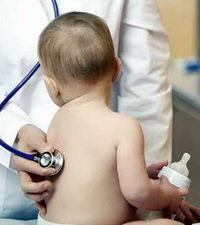
As mentioned above, the weakening of the child's immunity can occur against the background of the intestinal or hypovitaminity dysbiosis. It is important to identify these states in the first year of life and under medical control to correlate. Children under 3 years in the autumn-winter-spring periods of the year showing the prevention of rickets of vitamin D preparations (Vigantol, Vitamin D2 and D3). In the summer, it is possible not to carry out the medical prevention of rickets, provided that the child spends a lot of time in the air (not necessarily under the right sunlight).
Polyvitamin preparations can be used as the prevention of imminent imminent of immunity (MULA-Titabs, Polyvit-Baby, Unicap, Center and others). Yeast preparations (yeast extract) possess a good conjugatory effect «Favorite», Pangamine and others.). Polyvitamin and yeast drugs are especially needed by children in autumn and spring when the natural weakening of immunity occurs.
It is important to establish a balanced nutrition. For the normal functioning of the immune system, it is necessary that the nutrition of the child is present proteins and fats for animal origin (dairy and fermented food, meat, fish), vitamins, the main source of which are vegetables and fruits. Summer children over 4 - 5 months old are very useful fresh, thermally not processed fruits, berries, juices. They contain a significantly larger amount of vitamins than in the same products after heat treatment or canning. The child's body can accumulate vitamins for the summer, which will strengthen its immune system.
A comprehensive effect on the body has hardening. There are different hardening techniques. Some suggest the dumping of cold water of the whole body, others - only some separate sites (legs to the knees, shoulders and neck). There are types of hardening without water procedures (air baths). But for all types of hardening there are general principles. Any hardening should be started gradually, gradually increasing the time of procedure and gradually lowering the temperature of the water (or air). Hardening should be carried out regularly, and if for some reason the procedures were interrupted, they need to renew them from the very beginning. Only subject to these rules, you can achieve a positive effect.
Some infectious diseases can be avoided by making preventive vaccinations. In addition to mandatory vaccinations from tuberculosis, poliomyelitis, cough, diphtheria, tetanus, measles, epidemic vapotitis exist flu vaccines, hepatitis A and in. Vaccination of the anti-influenza vaccine must be made before the field of flu epidemic so that the immunity has managed to work out. Do the vaccination from influenza in the middle of the epidemic, or when the child already fell ill does not make sense, since the vaccination will not protect the child from the disease.
Since one of the factors that weaken immunity are worms, parents need to remember the measures of hygiene: to teach the child to wash their hands, not allow games in the hallway and restroom, to ensure that the child does not raise items on the street and not stroking street animals, periodically spend at home Wet cleaning and wash with soap toys. Given the complexity of the diagnosis of worms on calves, it is possible to carry out preventive anti-shine courses several times a year, especially in the fall.
What to do if the child often sick
If the child often sicks, you need to continue or begin the generalifying preventive measures, which was mentioned above: Vitaminotherapy, balanced nutrition and others. It is important to cure chronic diseases, especially the pathology of LOR - organs: chronic tonsillitis, sinusites (sinusitis, front), adenoid.
Parents of frequently ill children need to consult a doctor (pediatrician, gastroenterologist, immunologist). You can pre-pass analyzes that will help establish the cause of weakened immunity: feces on dysbacteriosis, blood for immune and interferon status. Depending on the clinical picture of frequently repetitive ARS, you can pass special tests: research on the detection of mycoplasma and pneumocists with a thrust cough (blood, strokes from the sewage), a smear from the oz with chronic tonsillitis and others.
To treat often ill-friendly children, drugs of non-specific impact (vitamins, adaptogens, biogenic stimulants and T.D.), as well as therapy with specific drugs aimed at certain unmune system links - immunocorrection (immunoglobulins, interferons, forks of the fork gland).


